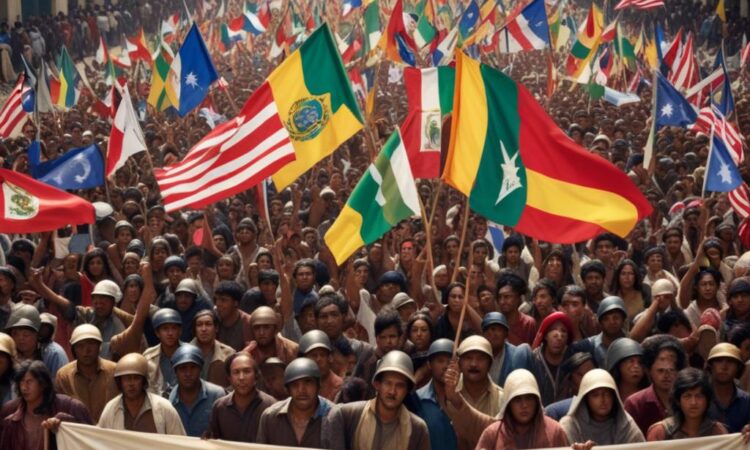Political Instability in Latin America: Protests and Unrest
Latin America, a region historically marked by political and economic turmoil, is once again grappling with widespread protests and unrest. Countries like Peru and Chile, among others, are witnessing a resurgence of social discontent fueled by deep-seated issues of economic inequality, corruption, and political polarization.
Peru: A Nation in Crisis
Peru, once hailed as a model of economic growth in the region, is now in the midst of a political crisis. Protests erupted in December 2022 following the impeachment and arrest of former President Pedro Castillo, who attempted to dissolve Congress and rule by decree. The situation escalated rapidly, leading to violent clashes between protesters and security forces, with numerous casualties and widespread disruptions to public services.
At the heart of Peru’s crisis lie deeply rooted problems of economic inequality, corruption, and political instability. Decades of neoliberal policies have concentrated wealth in the hands of a small elite, leaving a large segment of the population impoverished and disenfranchised. Corruption has become endemic, eroding public trust in institutions and fueling popular anger.
The political landscape is characterized by deep divisions and a lack of consensus on how to address the country’s pressing challenges. The recent wave of protests reflects a growing sense of frustration among Peruvians who feel that their voices are not being heard and their needs are not being met.
Chile: A Legacy of Inequality
Chile, known for its economic stability and social progress, has also experienced a resurgence of social unrest in recent years. The \”estallido social\” (social outbreak) of 2019, triggered by a hike in public transport fares, highlighted the persistent inequalities that plague Chilean society.
Despite Chile’s economic success, vast disparities in income, access to healthcare, and education have created deep social divides. The concentration of wealth in the hands of a few, coupled with a history of political repression, has bred a sense of dissatisfaction and resentment among a significant portion of the population.
The protests in Chile, while initially focused on economic grievances, have evolved into a broader demand for social justice and political reform. Protesters are calling for a new social contract that addresses issues of inequality, corruption, and the lack of representation.
The Roots of Unrest
The recent wave of protests in Latin America is not an isolated phenomenon. It reflects a deeper malaise that has been simmering for decades, fueled by a combination of factors:
- Economic Inequality: Extreme disparities in wealth and income continue to be a defining feature of Latin American societies. The gap between the rich and the poor has widened in recent years, leading to widespread poverty, unemployment, and social exclusion.
- Corruption: Corruption is endemic in many Latin American countries, undermining public trust in institutions and diverting resources from essential services. Cases of bribery, embezzlement, and illicit enrichment are commonplace, fueling public anger and frustration.
- Political Polarization: The political landscape in Latin America is increasingly polarized, with deep divisions between left-wing and right-wing parties. This polarization has made it difficult to forge consensus and implement policies that address the region’s pressing challenges.
- Lack of Representation: Many Latin Americans feel that their voices are not being heard by their governments. The political system often seems unresponsive to the needs of the majority, further exacerbating social tensions.
Addressing the Crisis
Addressing the crisis in Latin America requires a multi-faceted approach that tackles the root causes of unrest. This includes:
- Reducing Economic Inequality: Implementing policies that promote inclusive growth, create decent jobs, and provide social safety nets for the most vulnerable populations.
- Combating Corruption: Strengthening institutions, enacting stricter laws against corruption, and promoting transparency and accountability in government.
- Promoting Political Dialogue: Facilitating dialogue and consensus-building between political parties and civil society to address the country’s challenges.
- Enhancing Citizen Participation: Strengthening democratic institutions and creating mechanisms for citizens to have a greater voice in decision-making processes.
A Time for Change
The protests and unrest in Latin America are a wake-up call for governments and leaders to address the region’s deep-seated problems. Ignoring these grievances will only fuel further instability and social unrest. The time for meaningful change is now.

